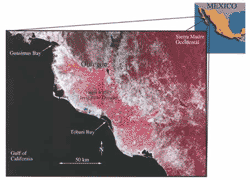| |
|
|
|
|
|
 |
 |
|
|||
| |
|
|
|||
| |
|
||||
 |
Center for Environmental Science and Policy
Stanford Institute for International Studies
Stanford University
![]()
|
The Yaqui Valley, in Sonora, Mexico is a region of rapid demographic, economic, and ecological change in both upland and coastal areas. While still in relatively early stages of growth, development alternatives that could foster win-win outcomes among various economic and environmental objectives are still possible. Research in the Valley has become timely and critical, both in the Valley's own right, and because it is a likely forerunner to similar irrigated valleys around the world.
Understanding these transitions, which affect sustainability, requires the integration of information from numerous scientific fields of study. Managing these transitions for maximum current and future welfare also requires policy analysis to develop relevant sets of policy and management alternatives that are based on good science. This project brings together the specialists needed to both develop fundamental understanding and explore management and policy alternatives that could increase human welfare and minimize resource and environmental risks in the Yaqui Basin. |
![]()
Encina Hall East, Stanford
University, California 94305
Phone (650)
736-1985 Fax (650) 725-1992 Email: Ashley
Dean
© Center for Environmental Science and Policy, Stanford University
 Situated
on the west coast of mainland Mexico on the Gulf of California,
the Valley currently comprises 225,000 hectares of irrigated wheat-based
agriculture: recently adding aquaculture to its landscape. It is
the birthplace of the Green Revolution for wheat and one of Mexico's
most productive breadbaskets. Today, population growth, urbanization,
agricultural intensification, land-use change, water diversions,
groundwater pumping, coastal modifications, wetland conversions,
and aquaculture growth threaten the sustainability of certain of
the region's resources.
Situated
on the west coast of mainland Mexico on the Gulf of California,
the Valley currently comprises 225,000 hectares of irrigated wheat-based
agriculture: recently adding aquaculture to its landscape. It is
the birthplace of the Green Revolution for wheat and one of Mexico's
most productive breadbaskets. Today, population growth, urbanization,
agricultural intensification, land-use change, water diversions,
groundwater pumping, coastal modifications, wetland conversions,
and aquaculture growth threaten the sustainability of certain of
the region's resources.